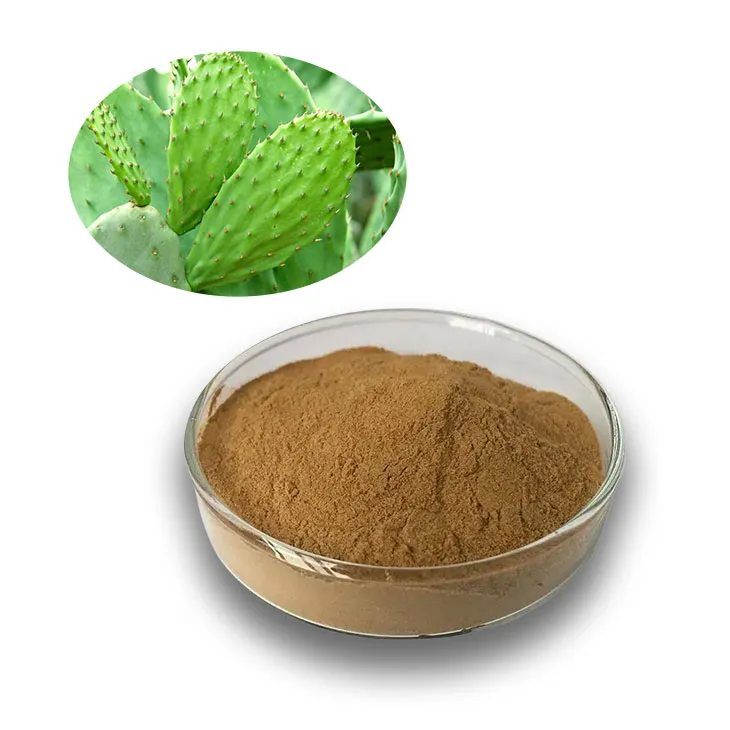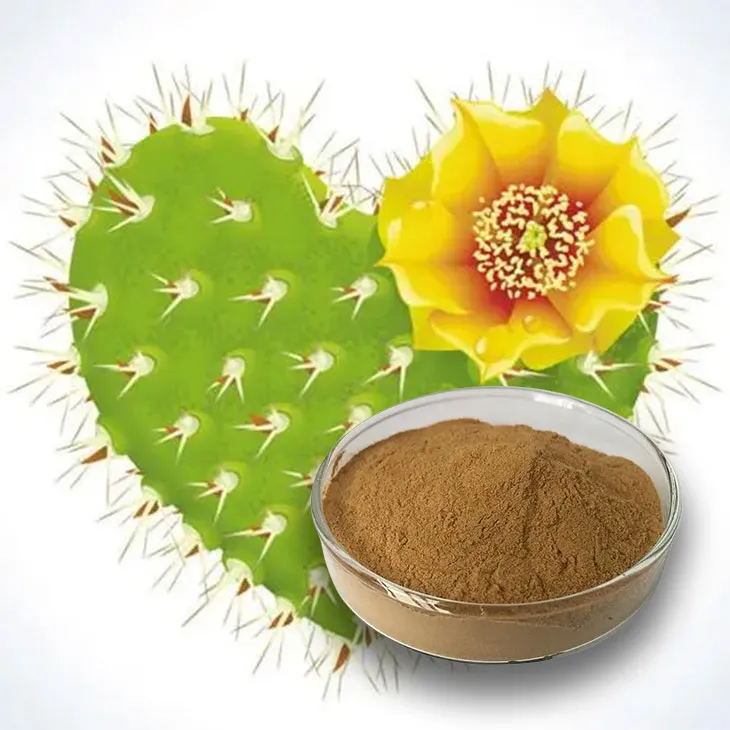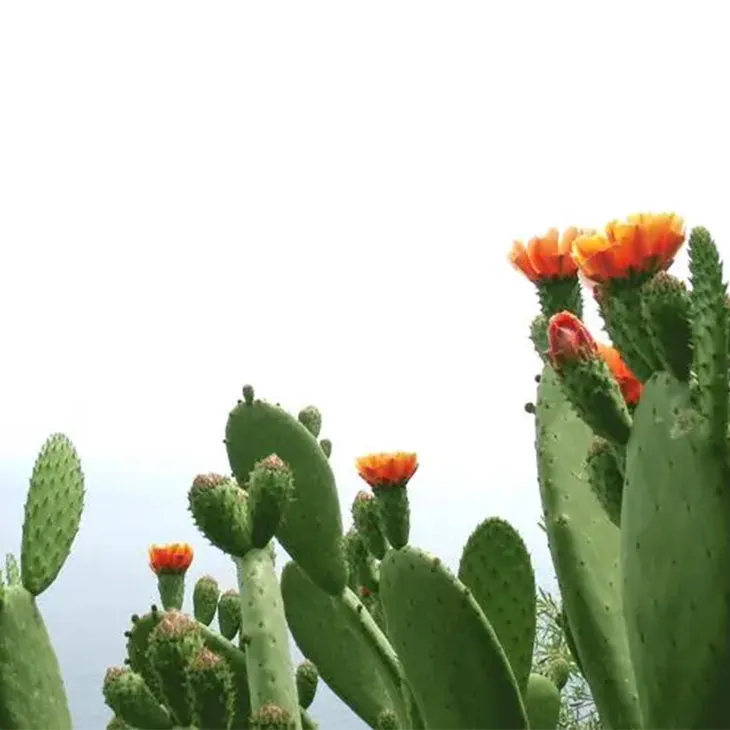- 0086-571-85302990
- sales@greenskybio.com
5 Great Reasons for Using Cactus Extract in the Food Industry.
2024-12-22

1. Nutritional Value
Cactus Extract is becoming a popular ingredient in the food industry, and one of the primary reasons is its unique nutritional value. Cacti are known to be rich sources of various vitamins and minerals that are essential for human health.
Vitamins play a crucial role in the body's normal functioning. For example, many cactus species contain vitamin C, which is a powerful antioxidant. It helps in the synthesis of collagen, a protein that is important for the health of our skin, bones, and connective tissues. Additionally, vitamin C boosts the immune system, helping the body to fight off infections. Some cacti also contain vitamin E, another antioxidant that protects cells from damage caused by free radicals.
When it comes to minerals, Cactus Extract can provide a significant amount of calcium, which is necessary for strong bones and teeth. Magnesium, also present in cactus, is involved in over 300 enzymatic reactions in the body, including those related to energy production and muscle function. Potassium, another mineral found in cacti, helps in maintaining proper heart function and regulating blood pressure.
Incorporating Cactus Extract into food products can be an excellent way to enhance their nutritional profile. For example, adding it to juices, smoothies, or health bars can provide consumers with an extra dose of these essential vitamins and minerals. This is especially beneficial for those who may not get enough of these nutrients from their regular diet.

2. Natural Preservative Properties
The natural preservative properties of cactus extract are another great reason for its use in the food industry. In a world where consumers are increasingly conscious about the ingredients in their food, natural preservatives are highly sought after.
Cactus extract contains certain compounds that can inhibit the growth of bacteria, yeasts, and molds. These microorganisms are the main culprits behind food spoilage. By preventing their growth, cactus extract can significantly extend the shelf - life of food products.
For instance, in the case of bakery products like bread, the addition of cactus extract can keep the bread fresh for a longer period. Normally, bread can start to develop mold within a few days, but with the presence of cactus extract, this process can be delayed. Similarly, in dairy products such as cheese or yogurt, cactus extract can help in maintaining their freshness and quality.
Compared to synthetic preservatives, cactus extract offers a more natural and potentially healthier alternative. Synthetic preservatives have sometimes been associated with negative health effects, such as allergic reactions or potential long - term health risks. Using cactus extract as a preservative can appeal to consumers who prefer "clean label" products, which are free from artificial additives.

3. Flavor Enhancement
Cactus extract also has the ability to enhance the flavor profile of food products, which is the third reason for its increasing use in the food industry.
The flavor of cactus extract can be described as a unique combination of earthy, slightly sweet, and tangy notes. When added to different types of food, it imparts a distinct and pleasant taste.
In savory dishes, cactus extract can add a depth of flavor. For example, in Mexican cuisine, which already makes extensive use of cactus (nopales), the extract can be used to intensify the characteristic flavors of traditional dishes. It can be added to stews, tacos, or enchiladas, enhancing the overall taste experience. In non - Mexican savory dishes, such as soups or stir - fries, cactus extract can introduce an interesting and novel flavor element.
When it comes to sweet products, cactus extract can also work wonders. It can be used in the production of jams, jellies, or fruit - based desserts. The slightly sweet and tangy flavor of the extract can complement the sweetness of fruits, creating a more complex and satisfying taste. For example, in a strawberry jam, adding cactus extract can give it a unique twist, making it stand out from regular strawberry jams.
Moreover, the flavor - enhancing properties of cactus extract can be used in the development of new and innovative food products. Food manufacturers can experiment with different concentrations of the extract to create unique flavor combinations that will attract consumers looking for novel taste experiences.

4. Antioxidant Capabilities
The antioxidant capabilities of cactus extract are yet another significant advantage in the food industry.
Antioxidants are substances that can prevent or slow down the oxidation of other molecules. Oxidation reactions in food can lead to the development of rancidity in fats, browning of fruits and vegetables, and a general degradation of food quality. Cactus extract, with its antioxidant properties, can act as a safeguard against these processes.
As mentioned earlier, cactus contains vitamins C and E, which are well - known antioxidants. However, it also contains other antioxidant compounds such as flavonoids and phenolic acids. These compounds work together to neutralize free radicals, which are highly reactive molecules that can cause damage to cells and molecules in food.
In the case of oils and fats used in food products, cactus extract can prevent them from going rancid. Rancid fats not only have an unpleasant smell and taste but can also be harmful to health. By adding cactus extract to products like salad dressings, margarine, or fried foods, manufacturers can ensure the quality and safety of these products for a longer period.
For fruits and vegetables, cactus extract can slow down the browning process. When fruits like apples or bananas are cut, they tend to turn brown due to oxidation. By treating them with cactus extract, this browning can be delayed, maintaining their visual appeal and freshness. This can be especially useful in the preparation of pre - cut fruits and vegetables for the food service industry or in ready - to - eat products.
5. Sustainability
Finally, cactus extract is a sustainable option for the food industry, which is an important consideration in today's environmentally conscious world.
Cacti are often easy to cultivate. They are well - adapted to arid and semi - arid regions, where they can thrive with minimal water requirements. This makes them a more sustainable crop compared to many other plants that need large amounts of water and fertile soil.
Moreover, cacti can be grown in areas that are not suitable for traditional agriculture. This means that they can be cultivated on marginal lands, without competing with food crops for prime agricultural land. For example, in desert regions, cacti can be a valuable source of income for local farmers, while also helping to combat desertification.
The cultivation of cacti also has a relatively low environmental impact. They require less pesticides and fertilizers compared to other crops, as they are naturally more resistant to pests and diseases. This reduces the potential for chemical runoff into water sources and soil contamination.
Using cactus extract in the food industry can contribute to a more sustainable food system. It encourages the use of a locally sourced, environmentally friendly ingredient that can replace less sustainable alternatives in food products.
FAQ:
What are the main vitamins and minerals in cactus extract?
Cactus extract is rich in vitamins such as vitamin C, vitamin E, and minerals like calcium, magnesium, and potassium. These nutrients play important roles in maintaining good health and can contribute to the nutritional value of food products when cactus extract is added.
How does cactus extract act as a natural preservative?
Cactus extract contains certain compounds that can inhibit the growth of microorganisms such as bacteria and fungi. By doing so, it helps to prevent spoilage and decay, thus effectively extending the shelf - life of food products without the need for artificial preservatives.
Can you describe the distinct flavor that cactus extract adds to food?
The flavor added by cactus extract is often described as fresh, slightly tangy, and earthy. It can add a unique depth of flavor to various food items, whether it's used in beverages, desserts, or savory dishes, enhancing the overall taste experience.
How do the antioxidant capabilities of cactus extract protect food?
The antioxidants in cactus extract can scavenge free radicals. Free radicals are reactive molecules that can cause oxidative damage to food components such as fats and proteins. By neutralizing these free radicals, cactus extract helps to maintain the quality, freshness, and nutritional integrity of food.
What makes cacti easy to cultivate for sustainable use in the food industry?
Cacti are often drought - tolerant plants that can survive in harsh environmental conditions with relatively low water requirements. They also don't need highly fertile soil and can be grown in areas where other crops may not thrive, making them a sustainable source for cactus extract production in the food industry.
Related literature
- The Nutritional and Functional Properties of Cactus Extracts in Food"
- "Cactus Extract: A Sustainable Ingredient for Food Preservation"
- "Enhancing Food Flavor with Cactus Extract"
- ▶ Hesperidin
- ▶ Citrus Bioflavonoids
- ▶ Plant Extract
- ▶ lycopene
- ▶ Diosmin
- ▶ Grape seed extract
- ▶ Sea buckthorn Juice Powder
- ▶ Fruit Juice Powder
- ▶ Hops Extract
- ▶ Artichoke Extract
- ▶ Mushroom extract
- ▶ Astaxanthin
- ▶ Green Tea Extract
- ▶ Curcumin
- ▶ Horse Chestnut Extract
- ▶ Other Product
- ▶ Boswellia Serrata Extract
- ▶ Resveratrol
- ▶ Marigold Extract
- ▶ Grape Leaf Extract
- ▶ New Product
- ▶ Aminolevulinic acid
- ▶ Cranberry Extract
- ▶ Red Yeast Rice
- ▶ Red Wine Extract
-
Camu Camu Extract
2024-12-22
-
Nutmeg Extract
2024-12-22
-
Hesperidin
2024-12-22
-
melatonin extract
2024-12-22
-
Diosmin
2024-12-22
-
Purple Sweet Potato Extract
2024-12-22
-
Sea buckthorn oil
2024-12-22
-
Black Garlic Extract
2024-12-22
-
Lavender Extract
2024-12-22
-
Europen Bilberry Extract
2024-12-22





















